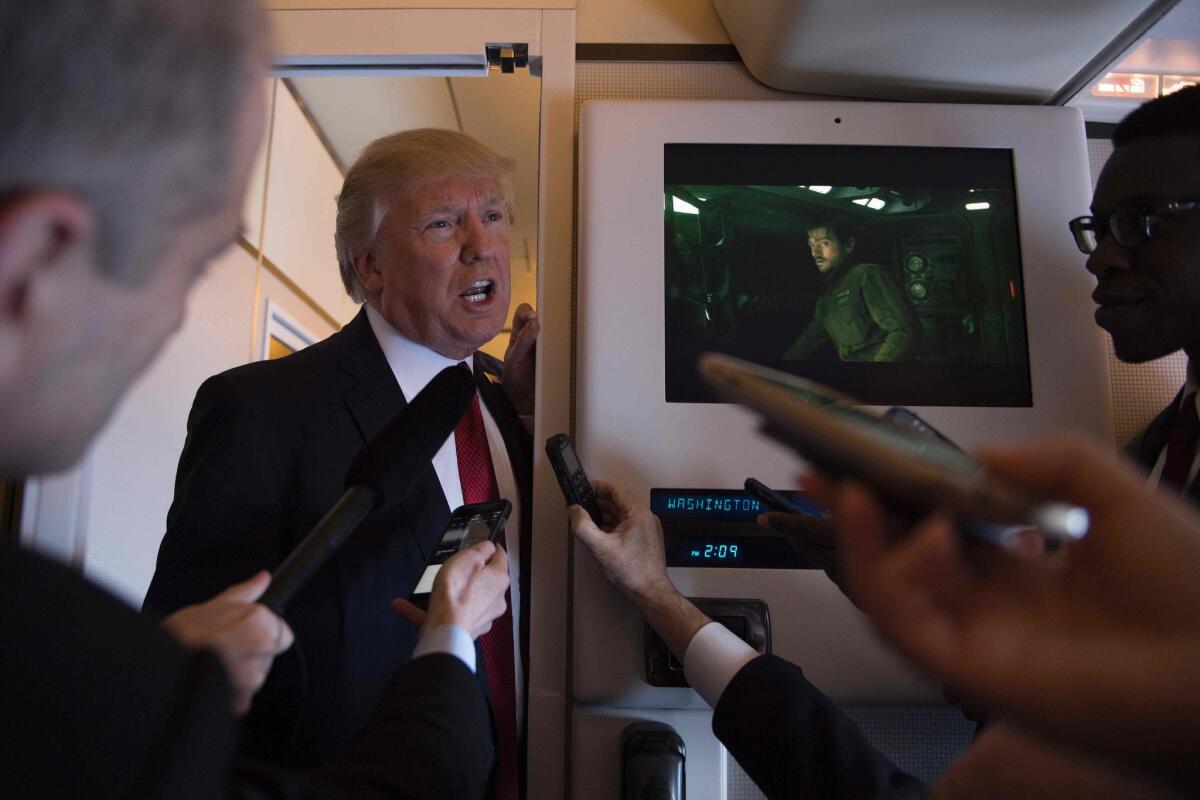Trump arrives in Florida for high-stakes summit with Chinese leader

- Share via
Reporting from West Palm Beach, Fla. — President Trump has arrived in Florida for his first face-to-face meetings with Chinese President Xi Jinping, armed with a full agenda of U.S. concerns but only modest expectations for results.
Trump and Xi are set to huddle for two days on the grounds of the president’s Mar-a-Lago resort to discuss a range of economic issues and, more significantly, worries about North Korea’s increased pace of nuclear development and ballistic missile tests.
“I think China will be stepping up,” Trump told reporters traveling with him Thursday aboard Air Force One.
But the gathering, which kicked off with a formal dinner, threatened to be overshadowed by the escalating crisis in Syria. Trump was also scheduled to meet with top military advisors on a potential limited military response to the Assad regime’s apparent use of chemical weapons against civilians.
Trump formally welcomed Xi on Thursday evening to what his administration has taken to calling the “Winter White House,” a stucco-and-coral rock neo-Mediterranean villa originally built by Marjorie Merriweather Post. The two leaders were scheduled to dine with about 30 others later.
On Friday the two will have a working lunch and other meetings with their respective delegations. Trump said he expected the meetings to focus most heavily on North Korea, but also trade.
“We have been treated unfairly and have made terrible trade deals with China for many, many years,” he said.
Summits between U.S. and Chinese leaders are typically tightly choreographed affairs, with the agenda and even public statements scripted long before the first meeting. Years of planning went into what the White House touted as an informal “shirt sleeves summit” between President Obama and Xi at the Sunnylands estate in Rancho Mirage in 2013.
But U.S. officials have emphasized that kind of detailed preparation isn’t the case for this summit. Their Chinese counterparts have said little about the meeting altogether.
“There’s going to be a very robust discussion,” was all White House Press Secretary Sean Spicer told reporters Thursday.
Treasury Secretary Steven T. Mnuchin and Commerce Secretary Wilbur Ross joined the president and First Lady Melania Trump on the flight to Palm Beach, where they were met by Secretary of State Rex Tillerson for the meeting with their Chinese counterparts. National security advisor H.R. McMaster also traveled with the president; First Daughter Ivanka Trump and her husband, Jared Kushner, were also to participate.
Xi’s delegation could not all be accommodated at Mar-a-Lago. They will instead stay at the Eau Palm Beach Resort and Spa in nearby Manalapan.
China has long been one of Trump’s favorite political punching bags, and was one of his most prominent foils during his presidential campaign. He accused Beijing of “raping” the U.S. economically, vowing to label them as a currency manipulator and take action to address a yawning trade deficit between the two nations.
While the Obama administration clashed with China on issues like cybersecurity and territorial claims in the South China Sea, Obama and Xi forged a key partnership on climate change that laid the groundwork for the historic Paris climate agreement.
Obama also pursued a major trade pact with Pacific powers, including Japan and Vietnam, both to boost U.S. exports to the rapidly growing region but also to cement America’s influence in the region as a check to China.
Trump’s decision to scrap the proposed Trans-Pacific Partnership may actually move countries in the region closer to China, which has sought to enact its own regional trade agreement.
Appearing with Obama for the final time, shortly after Trump’s election, Xi said the U.S.-China relationship had come to a “hinge moment,” but that he hoped the bilateral relationship would continue to grow.
Weeks later, before his inauguration, Trump spoke by phone with the leader of Taiwan, breaking with the longstanding U.S. recognition of China’s “One China” policy, which does not recognize the island as an independent state.
Weeks later, however, Trump and Xi spoke by phone and the White House put out a statement affirming the policy followed by every president since Richard Nixon.
Briefing reporters ahead of Xi’s visit, Acting Assistant Secretary of State for East Asian Affairs Susan Thornton said she believed the flap had been put to rest.
“We certainly hope that they [the Chinese] are going to be more helpful” on North Korea, Thornton said. “We want to see even better cooperation to try to bring about a solution to the North Korea threat, but we’ll certainly be talking to them about what more they can do, and we are looking to them to be doing more in the future.”
Diplomats have noted that Tillerson, who greeted Xi upon his arrival in Palm Beach on Thursday, seemed to take on traditional Communist China talking points when he was in Beijing last month, speaking of “win-win” outcomes and “mutual respect.”
China has long interpreted that language to indicate no interference on issues such as Tibet and human rights, but Thornton said that interpretation was off base.
“I think people have focused a little bit too much on this specific use of this language,” she said.
»
noah.bierman@latimes.com | @noahbierman
Bierman reported from West Palm Beach and Memoli from Washington. Times staff writer Tracy Wilkinson contributed.
ALSO
The U.S. is abdicating its role as the world’s climate leader. Can China take its place?
As he gets ready to meet Trump in Florida, China’s Xi Jinping has a lot to worry about
UPDATES:
3:55 p.m.: This story was updated with additional background.
This story was originally published at 1 p.m.
More to Read
Get the L.A. Times Politics newsletter
Deeply reported insights into legislation, politics and policy from Sacramento, Washington and beyond. In your inbox twice per week.
You may occasionally receive promotional content from the Los Angeles Times.








